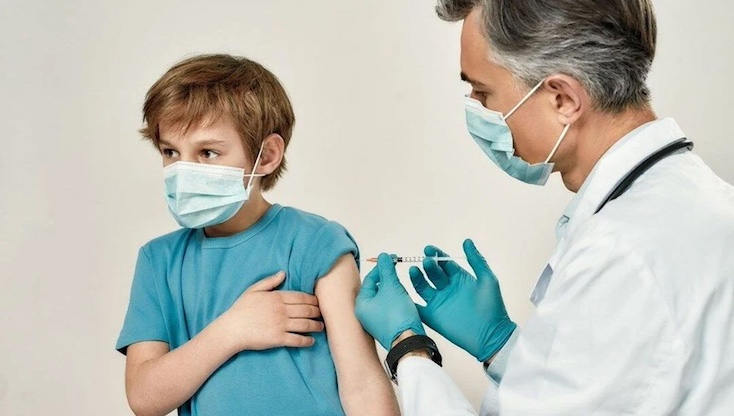
A bombshell study reveals that COVID-vaccinated children face a 23% surge in vaccine-acquired immune deficiency syndrome (VAIDS), with official data exposing a significant rise in autoimmune diagnoses following vaccination. Published in Pediatric Rheumatology, the large-scale pediatric cohort study pinpoints a mean onset latency of nearly 9 months, raising urgent concerns about the vaccine’s long-term impact on kids.
Titled “Investigating the association between SARS-CoV-2 infection, COVID-19 vaccination, and autoimmune diseases in a pediatric population: a comprehensive analysis,” the study found no increased autoimmune risk from COVID-19 infection itself but confirmed a statistically significant 23% higher risk of autoimmune conditions in vaccinated children. These alarming findings, detailed in the peer-reviewed journal, intensify scrutiny over the safety of COVID-19 vaccines for young populations and demand immediate attention from health authorities.
Background
During the COVID-19 pandemic there were reports of an increased association between COVID 19 and various autoimmune diseases (AID) in adults. This study aims to investigate the incidence of AIDs in children before and during the pandemic and explores potential links to SARS-CoV-2 vaccination.
Methods
We analyzed 493,705 anonymized medical records from Maccabi Healthcare Services, Israel’s second-largest healthcare provider, to study AID incidence during 2014–2022. The study period was divided into three phases: two pre-pandemic phases of equal duration (A and B) and a pandemic phase (C).
Results
Of 4,596 (0.9%) patients diagnosed with an AID in the cohort, incidence rates were 0.9% for Group A (2014–2016), 1.0% for Group B (2017–2019), and 0.9% for Group C (2020–2022) (p = 0.13). Logistic regression showed no significant differences in overall autoimmune disease incidence between the pre-COVID and COVID periods. Notably, specific conditions like celiac disease showed reduced incidence in Group A (OR 0.8309, p = 0.0071) while arthritis was significantly more common in Groups A and B. Additionally, COVID-19 diagnosis was not significantly associated with increased autoimmune disease risk (HR 1.092, p = 0.491); however, receiving at least one COVID vaccine was linked to higher risk (HR 1.2323, p = 0.0033).
Conclusion
Our findings suggest that the overall incidence of new-onset autoimmune diseases in children remained relatively stable during the COVID-19 pandemic. The study indicates a potential association between COVID-19 vaccination and an increased risk of developing autoimmune diseases, necessitating further research to elucidate long-term effects in the pediatric population.

Thefocalpoints.com reports: Let’s break down the findings:

BYPASS THE CENSORS
Sign up to get unfiltered news delivered straight to your inbox.
You can unsubscribe any time. By subscribing you agree to our Terms of Use
Study Overview
- Population: 493,705 children and adolescents (ages 1–21) from Israel’s Maccabi Healthcare Services
- Study Period: 2014–2022
- Design: Retrospective cohort study comparing three equal time periods:
- Group A (2014–2016): Pre-pandemic
- Group B (2017–2019): Pre-pandemic
- Group C (2020–2022): COVID-19 pandemic and vaccine rollout
1. Overall Autoimmune Disease Incidence
- Autoimmune diagnoses remained relatively stable across all groups:
- Group A: 0.9%
- Group B: 1.0%
- Group C: 0.9%
- p = 0.13 (not statistically significant)
2. Impact of COVID-19 Infection
- Hazard Ratio (HR): 1.092
- p = 0.491
Children with prior COVID-19 infection did not have a statistically significant increase in risk for developing autoimmune disease.
Bill Gates Caught Spiking Pet Vaccines with Depopulation Drugs
3. Impact of COVID-19 Vaccination
- Hazard Ratio (HR): 1.2323
- p = 0.0033
Vaccinated children had a 23% higher risk of developing new-onset autoimmune disease compared to unvaccinated children during the same period, after controlling for age, sex, and socioeconomic status.
4. Time to Autoimmune Onset Post-Vaccination
The mean time interval between COVID-19 vaccination and the onset of autoimmune disease was 8.74 months (Interquartile Range: 4.73–13.11 months).
This long latency suggests autoimmune reactions may take many months to clinically manifest post-vaccination.
This major pediatric study confirms that COVID-19 infection posed no measurable autoimmune risk to children—but COVID-19 vaccines do. With a 23% increased risk of new-onset autoimmune disease and an average delay of nearly 9 months before symptoms emerged, these findings underscore the clear long-term dangers of COVID-19 vaccination.
Thankfully, HHS is expected to stop pushing COVID-19 vaccines on children in the coming days.

